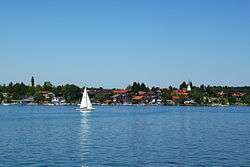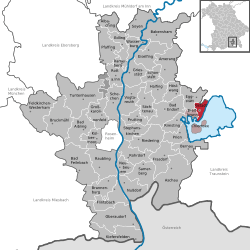Gstadt am Chiemsee
Gstadt am Chiemsee is a municipality in the district of Rosenheim, Bavaria, Germany. It is located on lake Chiemsee.
Gstadt a.Chiemsee | |
|---|---|
 Gstadt am Chiemsee | |
 Coat of arms | |
Location of Gstadt a.Chiemsee within Rosenheim district  | |
 Gstadt a.Chiemsee  Gstadt a.Chiemsee | |
| Coordinates: 47°53′N 12°25′E | |
| Country | Germany |
| State | Bavaria |
| Admin. region | Oberbayern |
| District | Rosenheim |
| Municipal assoc. | Breitbrunn |
| Government | |
| • Mayor | Bernhard Hainz (FW) |
| Area | |
| • Total | 10.70 km2 (4.13 sq mi) |
| Elevation | 538 m (1,765 ft) |
| Population (2018-12-31)[1] | |
| • Total | 1,192 |
| • Density | 110/km2 (290/sq mi) |
| Time zone | CET/CEST (UTC+1/+2) |
| Postal codes | 83257 |
| Dialling codes | 08054 |
| Vehicle registration | RO |
| Website | www.gstadt.de |
Municipal parts
Gstadt am Chiemsee consists of the municipal parts of
- Gollenshausen
- Gstadt
- Aich
- Aiglsbuch
- Aisching
- Ed
- Lienzing
- Lienzinger Moos
- Loiberting
- Mitterndorf
- Plötzing
- Preinersdorf
- Schalchen
- Söll
- Weingarten
History
Gstadt am Chiemsee formerly belonged the monastery of Frauenchiemsee. After the administrative reform of Bavaria in 1818 it became a municipality. The earliest evidence of settlements, such as commodities or remains of lake dwellings, point to the Stone and Bronze Age from 5000 - 500 BC. The findings can be viewed in Bedaium Museum in Seebruck and Museum in Traunstein. In the Middle Ages, Bavarians from the Elbe river area settled in the region. Gstadt is located on the north side of lake Chiemsee, the largest lake in Bavaria (84 km2), and is also called "Bayerische Meer" (Bavarian Sea). Gstadt (original name "Gestadte") located in the "Chiemgau" region (a former Roman province of Noricum) was first documented in 1168 and was the departure point for boats crossing to the monastery of Frauenchiemsee. Later in the 19th century, the town was frequently visited by poets, writers and painters arriving on stagecoaches from Munich on their way to the islands. Through the centuries Gstadt remained loyal to agriculture and started to cater to tourism after World War II.
References
- "Fortschreibung des Bevölkerungsstandes". Bayerisches Landesamt für Statistik und Datenverarbeitung (in German). July 2019.